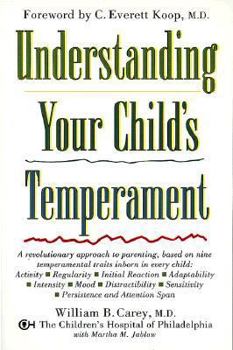Understanding Your Child's Temperament
Select Format
Select Condition 
Book Overview
"This book ... should revolutionize parenting for many readers." --Former U.S. Surgeon General Dr. C. Everett Koop, from the Foreword From a Respected Pediatrician Comes This Liberating Approach to Parenting Dr. William B. Carey, director of Behavioral Pediatrics at the renowned Children's Hospital of Philadelphia, brings important research to the public in this enlightening book. Unlike many approaches to parenting that view children in relation to just one particular trait or behavior, Understanding Your Child's Temperament offers a way to look at your child in his or her totality, as a combination of nine different kinds of behavioral styles. Temperament is an individual's unique way of reacting to people, things, and situations--at home, at school, and in the community. Anxious parents can breathe a sigh of relief: Dr. Carey makes it clear that a child's temperament is mostly inborn, and not something caused by "good" or "bad" parenting. And, reassuringly, he explains that while about 50 percent of a child's temperament is genetic, parents can learn to work with it to prevent and reduce problems. Using Dr. Carey's practical strategies, parents will learn how to: profile a child's temperament in relation to nine aspects: activity - adaptability - distractibility - initial reaction - intensity - mood - persistence and attention span - regularity - sensitivity see both the positive and negative sides of temperaments apply the most rewarding techniques for working with your child's inborn nature tailor parental discipline to each child's temperament, and more Comprehensive and filled with Dr. Carey's warm and wise counsel, Understanding Your Child's Temperament belongs in every family's library and is sure to be consulted again and again. http: //www.mgr.com
Format:Paperback
Language:English
ISBN:0028628268
ISBN13:9780028628264
Release Date:January 1999
Publisher:MacMillan Publishing Company
Length:228 Pages
Weight:0.70 lbs.
Dimensions:0.6" x 5.5" x 8.3"
Customer Reviews
3 ratings
Fascinating insight into children's behavior
Published by Thriftbooks.com User , 24 years ago
Even though I am only an aunt to two children - and not a parent - I found that this book provides valuable information for anyone dealing with children. Dr. Carey dispells the myth that babies and children are 'blank slates' that can be regulated, scheduled and expected to behave in certain ways. One of the most heartening aspects of the book is that Dr. Carey shows both the "positive" and "negative" aspects of each type of termperament he identifies, avoiding completely the categorizing of any sort of personality as 'problematic.'His argument against the use of Ritalin is very persuasive, as so many of the children prescribed the drug are actually exhibiting behaviors that are within the range of "normal." Parents having "trouble" dealing with their child's behavior would learn a great deal from this book, particularly how modifying their own actions can influence an individual child's "fit" with his or her environment. The writing is quite accessible, with concrete examples to illustrate the key points and strategies that can be applied when dealing with children. I've recommended this book to several of my friends and colleagues with children, and they have all found it thoroughly useful and informative. And I, merely as a party interested in behavior and children, found it an accessible and fascinating book that taught me a great deal about how to deal with my own niece and nephew!
temperment analysis is a powerful tool to figure out a child
Published by Thriftbooks.com User , 26 years ago
this temperment approach makes sense of a lot of my two children's behavior over the last few (9 & 5) years. I've seen way too many children on ridelin and agree with the author that temperment has to be considered before we start doping up our kids with speed to make them temporarily easier to deal with. The case studies are carefully selected and get across the author's theories effectively while making the book understandable to any parent interested in children's behavier.
Extremely useful book for all parents!
Published by Thriftbooks.com User , 27 years ago
This book is an extremely helpful resource for all parents, especially those who consider their children difficult. An explanation is given of what temperament is, along with a discussion of the wide range of normal behaviors, some of which have traditionally been labeled as abnormal in the past but are actually just variations of normal. The book's most useful aspect as I see it is its guidelines for reducing the amount of stress and conflict between parent(s) and child(ren). A suggested plan is given for identifying the temperament profile of your child and how to spot the trouble areas, which depend not only on the child's innate temperament but how well that temperament "fits" with the parent's expectations for the child. To alleviate stress in problem areas (such as a naturally slow and careful child with active, fast-paced parents who are aggravated by the child's pace) Dr. Carey gives many specific suggestions and strategies for adapting to the child's style. This is one thing I really like about the book: there are many, many specific, concrete examples and suggestions of things to say and do, that a parent can use right away. Besides the notion that many behaviors considered "problems" by some parents and health care professionals are actually variations of normal behavior, another important point is that extremes of behavior that are problematic in a small child (such as dogged persistence leading to inflexibility) can be assets later in life (persistence is a good thing for most adults). This book can change lives for parents who are fed up with their children, or who find themselves at their wits' end dealing with them. It can immediately make life easier for all members of a family. Even for parents who don't feel quite so frazzled by their children, there is much important insight to be gained from Understanding Your Child's Temperament. I recommend it to all parents.





